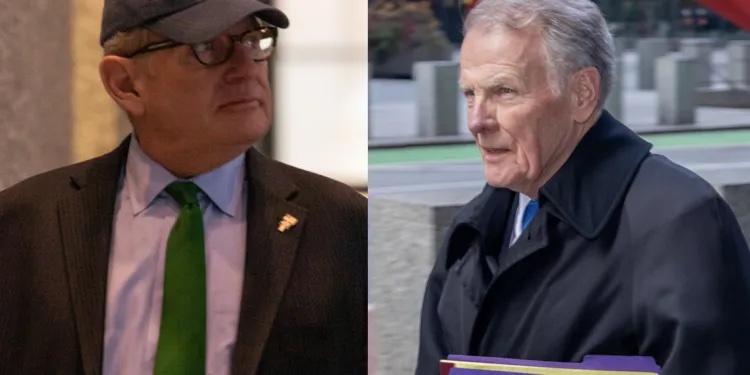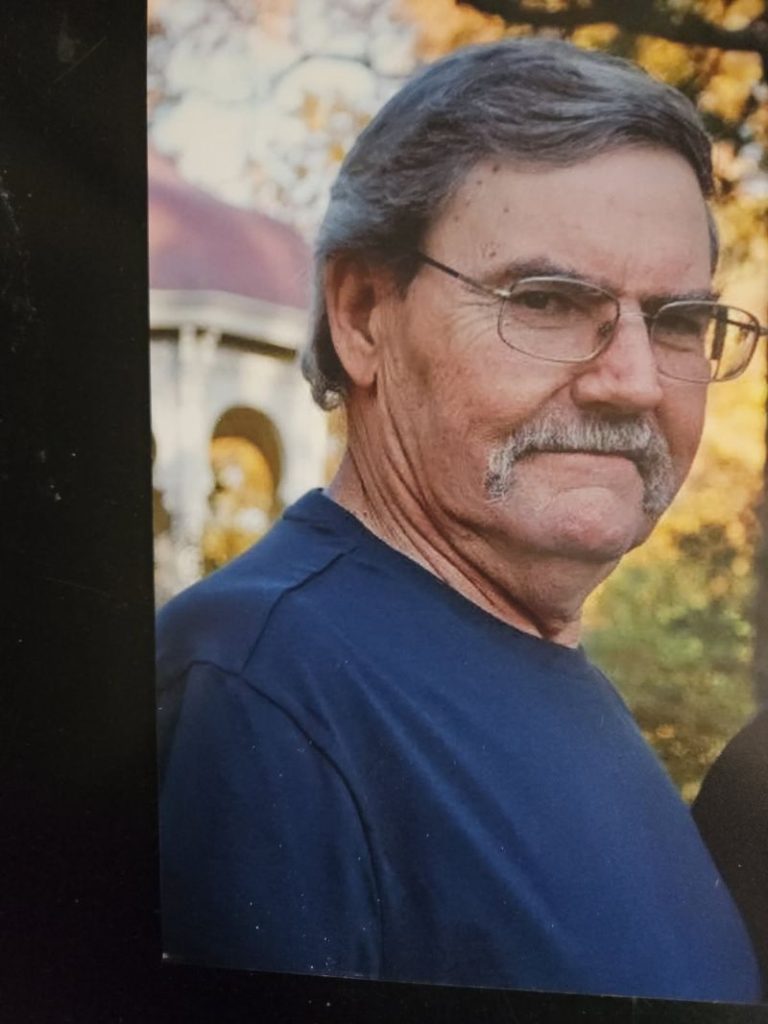McClain had unparalleled access to speaker, ex-top aide testifies

CHICAGO – Under the stained glass dome of the Capitol in Springfield, lobbyists often wander the building, popping into a quiet corner to make a phone call or ducking into an empty committee room to send emails.
Some veteran lobbyists have longstanding arrangements with lawmakers who allow them to hang out in their office, or at least provide a place to stash a coat during long session days.
But no lobbyist had a makeshift office setup quite like Mike McClain, who – owing to his longtime friendship with former Illinois House Speaker Michael Madigan – roamed freely in and out of the speaker’s suite of offices on the third floor of the Statehouse. When he wasn’t holding court on the bench outside the door to Room 300, McClain could often be found getting work done in the small conference room within.
McClain’s access to the often-elusive Madigan – and the rare trust the speaker placed in McClain – are central to federal corruption charges alleging the way they wielded Madigan’s power was tantamount to a “criminal enterprise” that enriched the speaker and his political allies.
Prosecutors have spent much of the first two weeks of their trial on those charges painting a picture of Madigan and McClain’s relationship. The jury has already heard dozens of phone calls between the two in which they discuss matters ranging from how to force a sitting House member to retire, down to the mundane, including making dinner plans.
In one clip, the famously cell phone-less Madigan used McClain’s phone to call his wife and read her the soups – “cream of broccoli, spinach with egg drops” – on the menu of a restaurant where they were apparently going to meet.
In addition to seeing McClain’s retirement announcement letter pledging his lifelong loyalty to Madigan and his family, the jury last week also heard calls in which McClain referred to the speaker as his “real client.”
And on Wednesday the jury heard another as the other party in the wiretapped call sat on the witness stand.
By the time of the call in April 2018, longtime Madigan staffer Will Cousineau had been lobbying for nearly a year after close to two decades in the speaker’s office. McClain asked Cousineau how he was finding “the dark side,” a term he used frequently to refer to lobbying, particularly if the lobbyist had left government service.
Cousineau replied that it was “stressful, but in a different way,” adding that years of campaign work had been “good training.”
“As long as we remember who our real client is,” McClain said. “It’s not easy, but it mollifies it.”
“Yep, it’s easy to keep your priorities straight if you remember that,” Cousineau said after noting that he had no regrets for missing a client call earlier that evening because he’d been with Madigan.
More than six years later, Assistant U.S. Attorney Julia Schwartz asked what Cousineau meant by that remark.
“Just keeping the speaker’s interests in mind,” he said.
Cousineau’s testimony, given under an immunity agreement with prosecutors, marks the third time he’s been called to the witness stand in related cases since March 2023. Those trials ended in convictions for McClain and Madigan’s former chief of staff Tim Mapes.
In describing Madigan’s and McClain’s relationship on Wednesday, Cousineau said “the speaker trusted Mr. McClain – his advice.” He also told the jury that McClain would frequently join strategic meetings with the speaker’s senior staff.
McClain would sometimes participate in Sunday “bill review” conference calls, Cousineau said, and was often included in political meetings discussing strategy and fundraising for Illinois House campaigns.
The jury also heard a call from December 2018 in which McClain opined for an uninterrupted 2 ½ minutes about how Madigan could better protect himself and his allies through key committee chair appointments amid turnover in the General Assembly.
Each time Schwartz asked Cousineau about a different type of meeting McClain regularly joined, she took pains to reiterate in her questions that McClain was not, nor had ever been, an employee in the speaker’s office.
Instead of coming up in Springfield as a staffer, McClain was thrown into politics at a young age when he was appointed to fill his father’s legislative seat after he’d had a fatal heart attack on the Illinois House floor in the early 1970s. After a decade in the General Assembly, McClain lost his re-election bid and pivoted to lobbying.
McClain eventually became electric utility Commonwealth Edison’s top contract lobbyist, with his final years on the job yielding some of the largest pieces of legislation for the company. Prosecutors now allege those laws only crossed the finish line because ComEd and McClain were bribing Madigan with jobs and contracts for the speaker’s political allies.
Read more: ComEd execs joked Madigan co-defendant was ‘double agent,’ utility’s former top lawyer testifies
As ComEd’s top external lobbyist, Cousineau testified that McClain attended some of the working group meetings within the speaker’s office on key legislation sought by the utility. That legislation included 2011’s Energy Infrastructure Modernization Act, also known as “Smart Grid,” and the “Future Energy Jobs Act” in 2016.
Pushed by Schwartz, Cousineau said he didn’t “know exactly why the speaker invited” McClain to an early 2015 staff meeting on energy legislation that would eventually become FEJA, but said he recalled McClain “talking about the interests of the company” in his capacity as a lobbyist for ComEd.
“But certainly he also understood the needs and concerns the speaker would have and over the years was a trusted advisor of the speaker,” Cousineau said. “So again, (he was) wearing both hats.”
Cousineau also spent a chunk of time on the witness stand Wednesday describing the anxious final days and weeks before FEJA passed the General Assembly in December 2016. Two previous ComEd-affiliated witnesses have already recounted the months of work that went into negotiating both EIMA and FEJA. The witnesses testified that while they never believed Madigan was guaranteeing passage for either bill, they viewed his willingness to loan out his top staff attorneys for extensive negotiations as a positive sign – even when those lawyers played hardball with the utility.
Those negotiations went up until the 11th hour on the FEJA bill, they said. But at some point before lawmakers took up the legislation, Cousineau said he realized FEJA wouldn’t have the votes to pass in the House. In response to the news, Cousineau said Madigan told him to go “work the bill” to secure enough votes for passage.
Read more: Former Madigan political director details push by speaker’s office for key ComEd bill
In the end, the bill passed with three more votes than it needed in the House, though Madigan was one of six representatives recorded as “not voting.” After passage through the Senate, then-Gov. Bruce Rauner quickly signed it into law.
Cousineau’s testimony ventured into McClain’s involvement in the Democratic Party of Illinois, which essentially functioned as the campaign arm for Madigan’s House Democratic caucus during the decades the speaker was party chair. In addition to his government job in the speaker’s office, Cousineau also was paid by the DPI, eventually serving as political director for the party.
Some of the names Cousineau identified – including campaign workers from Madigan’s power base in his native 13th Ward on Chicago’s Southwest Side – are setting the table for further evidence and testimony heard in last year’s “ComEd Four” trial. In that trial, longtime 13th Ward precinct captain Ed Moody testified that he was given a no-work contract at ComEd essentially as payment for the door-knocking he did for Democratic candidates.
Read more: Top Madigan foot soldier testifies he didn’t work for $4,500 monthly checks
And before trial broke for the day, Cousineau began testifying about working together with McClain on gambling legislation in the spring of 2018 – more than a year after McClain had officially retired from lobbying. Asked what business McClain had negotiating gambling bills without being a registered lobbyist, Cousineau said he believed McClain was involved at Madigan’s request.
At Mapes’ trial last summer, state Rep. Bob Rita, D-Blue Island, testified that in 2013, Madigan told him that he’d be taking over as the caucus’ lead sponsor and negotiator on all gambling issues. As Rita was leaving the speaker’s office, he said McClain was standing on the other side of the door and Madigan told him, “He will guide you.”
Rita, who began testimony in the current trial late last week, did not return to the witness stand on Monday and his absence has not been explained since.
Capitol News Illinois is a nonprofit, nonpartisan news service that distributes state government coverage to hundreds of news outlets statewide. It is funded primarily by the Illinois Press Foundation and the Robert R. McCormick Foundation.
This article first appeared on Capitol News Illinois and is republished here under a Creative Commons license.
Miss Clipping Out Stories to Save for Later?
Click the Purchase Story button below to order a print of this story. We will print it for you on matte photo paper to keep forever.

